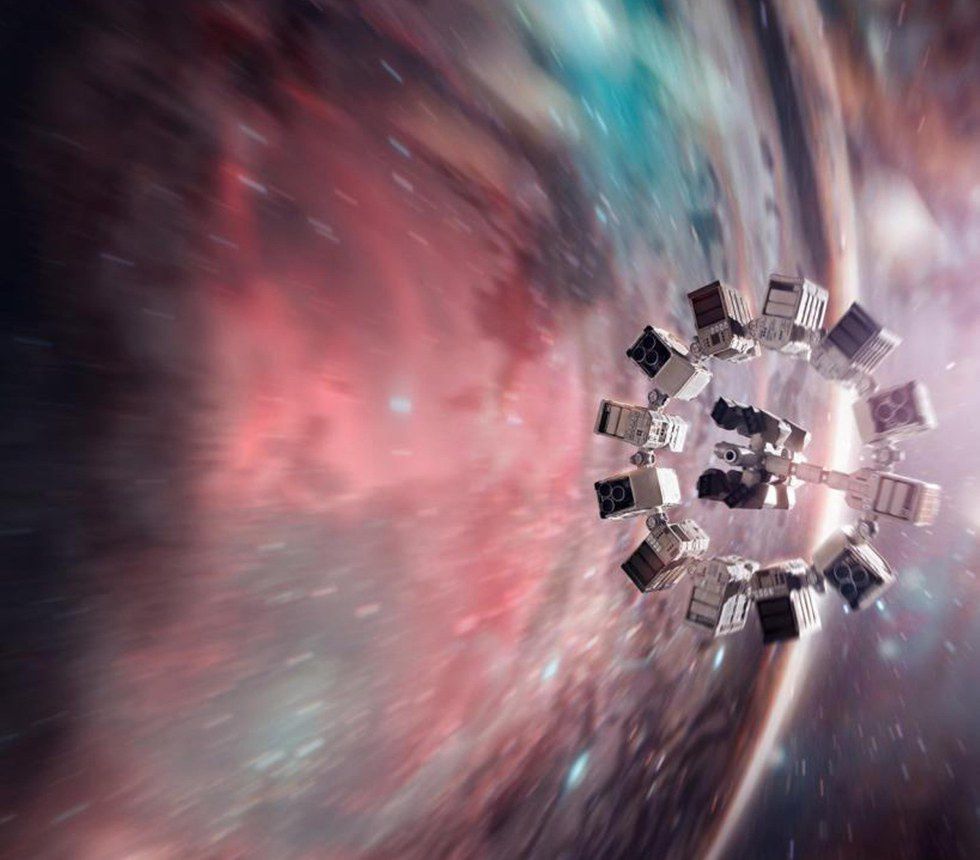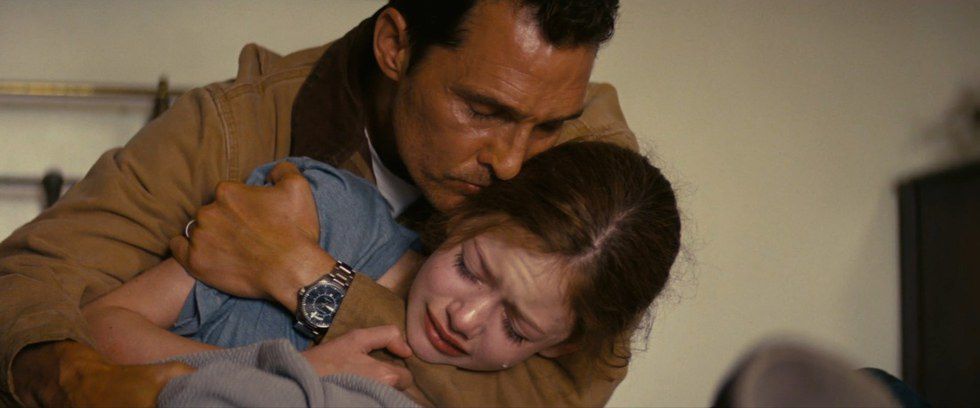"Interstellar" is an ambitious film by director Christopher Nolan ("Dark Knight" Trilogy, "Inception"). Its plot focuses around a pilot turned farmer named Cooper who lives on an Earth that is on the verge of mass extinction due to environmental catastrophes. Cooper suddenly cracks a mysterious set of codes, that are placed by a "ghost" in his daughter's room, that take him to an underground facility housing the current projects for NASA. Cooper is then recruited by NASA to find a new home for his family and humankind in an odd wormhole that leads to habitable planets in a distant galaxy.
The scope of the film is grandiose. Wormholes, black holes, and inter-dimensional travel make Interstellar probably the farthest journeying science fiction film I have ever seen. Some critics make comparisons to Kubrick's masterpiece 2001: A Space Odyssey, but I currently don't feel the film is there yet. It has several flaws that hold it back including the characters and the extremely awkward climax.
*Spoilers Warning*
Besides those flaws, the movie is amazing. If it would've been rated on visuals alone, a clear 10/10. Nolan's use of digital and practical effects are refreshing to contrast the excessive use of CGI in modern films. Scenes such as the passage through the wormhole, inside the black hole, and even the cornfield chase are so beautifully shot. Also, Hans Zimmer's soundtrack is, no pun intended, out of this world. I would put it on a top five list in the likes of John Williams' "Star Wars" and Howard Shore's "Lord of the Rings". This film also has several deep themes and homages.
Matt Damon's character, Dr. Mann, is a direct reference to mankind. His selfish act of luring the crew to his lifeless planet and hijacking the shuttle to complete the mission alone, reflects our very human tendency for self preservation. The story also mirrors that of Joseph Conrad's Heart of Darkness, the ship captain Marlow could be seen as Cooper and the self absorbed Dr. Mann as Kurtz. The spaceship which passes forward through space and time is an homage to Marlow's steamboat that seemingly passes back in time as they enter further into the jungle.
Religious references are plentiful as well. The first mission to travel towards habitable planets was named the Lazarus program, after the biblical figure which Jesus resurrects. When Cooper takes Mann out of his self induced slumber it is as if Mann is revived from the dead like Lazarus. Cooper also replicates a different member of the Holy Trinity throughout the film. He becomes a Jesus figure when he sacrifices himself to save mankind and enters the black hole. Inside the black hole, Cooper comes to realize that he is Murph's ghost in the beginning of the film (the Holy Spirit). Lastly, his constant inter dimensional travel through space and time makes him an omnipotent, God figure. Or even saying that he is the Father in the trinity because he is quiet literally the father of the girl who ends up delivering his message (the math equation) on how to save humanity.
If that wasn't enough, Hans Zimmer's use of the organ in the soundtrack was purposely done to give the film a religious undertone.
I believe the biggest question the film tackles is mankind's place in the universe. Dr. Brand constantly rehearses the Dylan Thomas poem "Do Not Go Gentle Into That Good Night" as a motivation for the crew to not give up on the mission to save humankind. But Brand's philosophy is a pessimistic one. He, alongside Dr. Mann, asserted that humans were much too selfish to sacrifice themselves or loved ones for the greater good of the human race. This can actually be seen in Cooper's own motives to leave Earth, he wants to save his daughter. He was willing to jeopardize the mission of repopulating another planet with humans just to return home and see his family again. But it was only until the climax of the film where Cooper realizes that returning home would be impossible and he sacrifices himself to save the mission. So will humanity "transcend" its own biological instincts for preservation to include the whole rather than the individual? Or are we doomed to end up lost in the vastness of time and space?
Interstellar provides a hopeful outlook for humanity but I'm glad it recognizes the direction we as a species are heading to. With environmental problems escalating at rapid rates and declining interest in space exploration, we are dooming our selves to be stuck on an Earth that may begin to lash out on us. I believe humans aren't meant to stay on Earth forever. We need to continue looking out into the vastness of our galaxy to not only look for a possible home but for the sake of human advancement.
Christopher Nolan's epic space drama is an enduring film. After seeing it for the fourth time, I still felt the same feeling of wonder and inspiration I had experienced when I first saw it in theaters. In my opinion, Interstellar will overtime resonate with movie fans who go back to watch the film a second time, which is a similar fate 2001 had. Its breathtaking visuals, emotional story, and philosophical undertones make Interstellar a staple for science fiction fans and a reminder of the curiosity humans hold when looking to the stars.










 man running in forestPhoto by
man running in forestPhoto by 





 "I thought you knew what you signed up for."
"I thought you knew what you signed up for." man and woman in bathtub
Photo by
man and woman in bathtub
Photo by  four women sitting on black steel bench during daytime
Photo by
four women sitting on black steel bench during daytime
Photo by  Uber app ready to ride on a smartphone.
Photo by
Uber app ready to ride on a smartphone.
Photo by  woman in red tank top and blue denim shorts standing beside woman in black tank top
Photo by
woman in red tank top and blue denim shorts standing beside woman in black tank top
Photo by  blue marker on white printer paper
Photo by
blue marker on white printer paper
Photo by  welcome signage on focus photography
Photo by
welcome signage on focus photography
Photo by  woman in white and black striped long sleeve shirt lying on bed
Photo by
woman in white and black striped long sleeve shirt lying on bed
Photo by  pink pig coin bank on brown wooden table
Photo by
pink pig coin bank on brown wooden table
Photo by  person holding iPhone 6 turned on
Photo by
person holding iPhone 6 turned on
Photo by  person holding pencil near laptop computer
Photo by
person holding pencil near laptop computer
Photo by  person slicing vegetable
Photo by
person slicing vegetable
Photo by 







